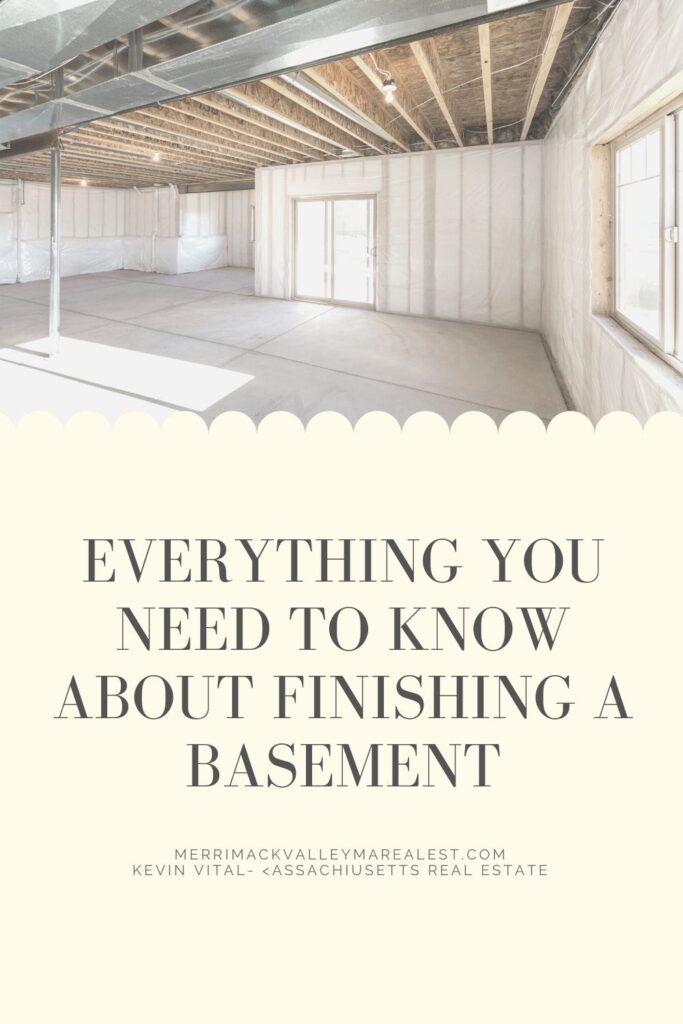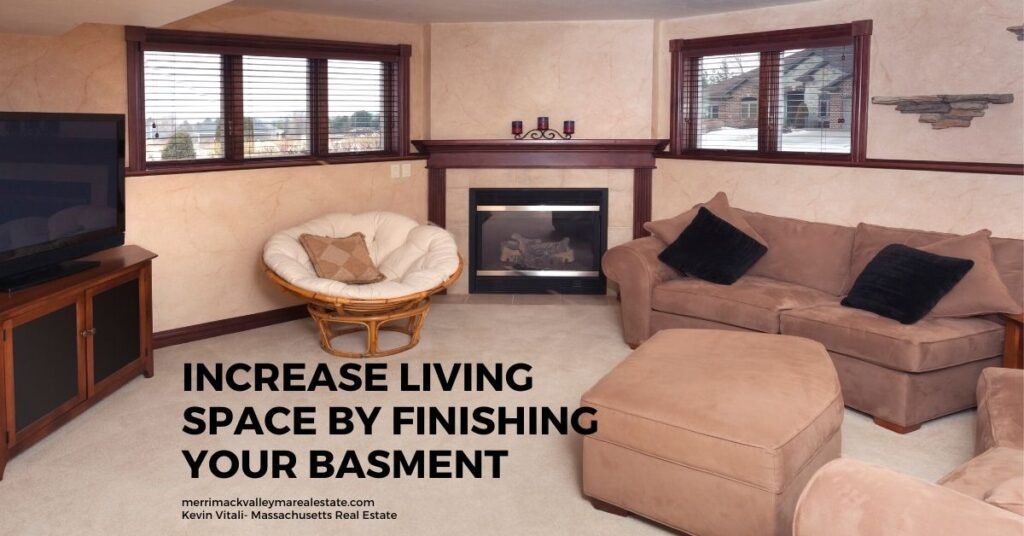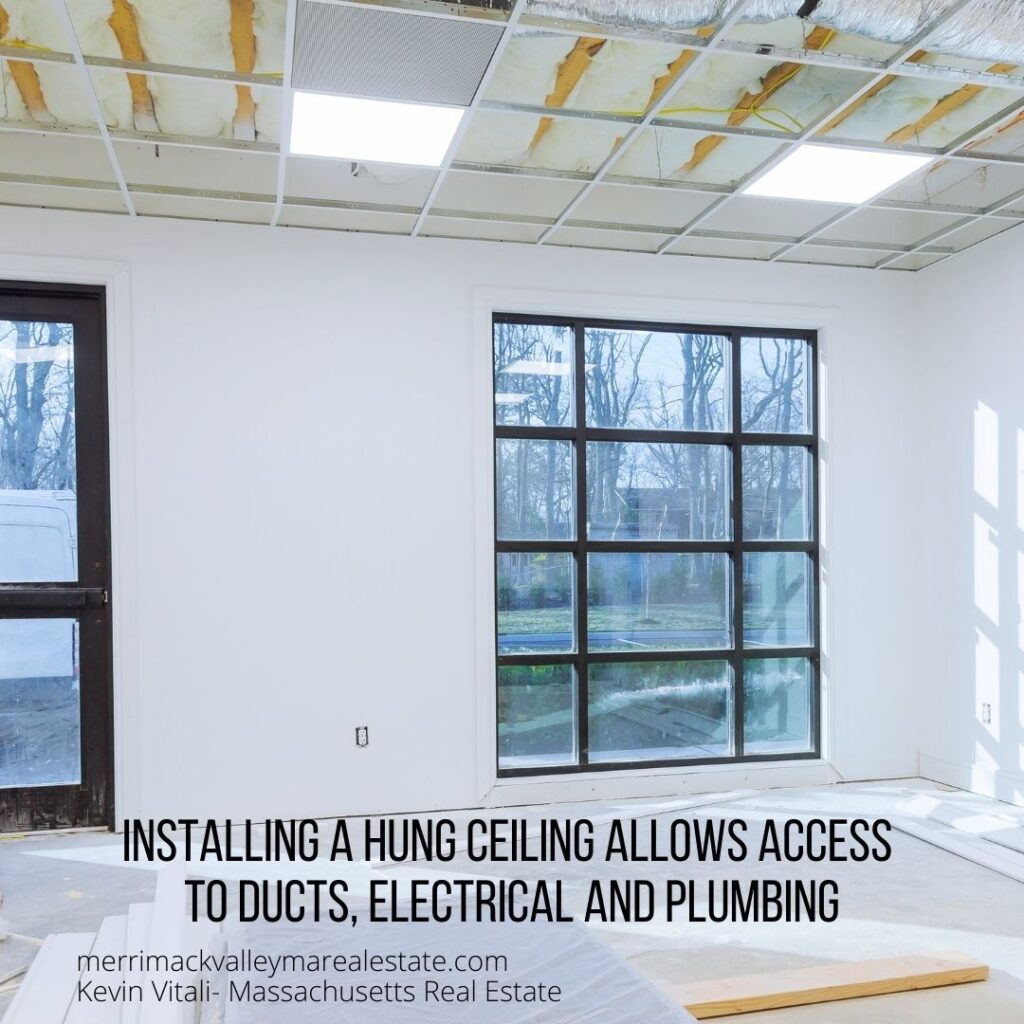
 Finishing a basement is a popular home improvement project. If your basement is unfinished with bare concrete floors and walls, you can tap into its potential to create extra space and square footage that is often needed by many homeowners. And, it could definitely be a desirable home feature buyer’s love, when it comes time to sell your home.
Finishing a basement is a popular home improvement project. If your basement is unfinished with bare concrete floors and walls, you can tap into its potential to create extra space and square footage that is often needed by many homeowners. And, it could definitely be a desirable home feature buyer’s love, when it comes time to sell your home.
Before you run off and take your unfinished basement and convert it to finished living space there are factors to be considered first.
Does A Finished Basement Add Value To A Home?
A finished basement can certainly add value to a home. But before tackling any renovation project, it is a good idea to understand how basement remodeling will affect the value of your home. To achieve a balance between the overall value you of your home and the cost of completing a renovation project a good rule of thumb to maintain a maximum return is to keep any project between 5-10% of the overall value of your home to avoid over-improving.
Do Finished Basements Count As Square Footage
Many home sellers are angry when a listing agent informs them their recent basement remodel does not add to the square footage of their home.
Most Multiple Listing Services including the Massachusetts MLS, list the square footage of a home as above grade or ground level living areas. The definition of habitable living space comes from the American National Standards Institute (ANSI). They clearly differentiate between above-grade and below-grade living areas. Appraisers follow the ANSI guidelines when determining the square footage of the home. For most buyers and sellers a home must appraise for a real estate transaction close.
So for the most part your basement or lower level renovation that is all or partially underground will not be counted in your home’s square footage. Some local MLS’s will allow you to differentiate between the below and above-grade square footage. But an appraiser will only use the above grade living areas in the home square foot calculation.
The good news is an appraiser has a lot of flexibility in the value they assign to a below-grade finished area of a home. In general, an appraiser will give the below-grade square footage a value that is 25% to 50% of the above-grade square foot price depending on whether there are windows and doors that lead outside, the level of the finish and the utility that is added by the basement renovation.
How Much Does Finishing a Basement Cost?
This is a bit of a loaded question and not one size fits all when answering this question. Much of determining the cost of finishing a basement depends on the level of finish and amenities you are looking for in your basement. Are you just looking to cover the concrete floor and concrete basement walls with just a few partition walls? Or, are you thinking of running plumbing for a basement bathroom addition and wet bar?
The average cost of a moderate basement remodels consisting of 500 to 1000 square feet can run between $35 to $100 a square foot including the cost of flooring, walls, permits, electrical and ceiling. Expect to pay between $20,000 to $45,000 for a small, modest basement remodel.
Consult with a contractor to get exact pricing on the cost of your basement remodels or if you are doing a DIY finished basement installation do your homework on the cost of materials.

Cost Vs. Value of a Finished Basement
Many homeowners jump into home improvement projects thinking that whatever they spend on the project will be a great way to increase their home’s value. Unfortunately, there is usually not a correlation between the cost of a basement renovation and the increased value of your home. Makes sure you understand the cost vs the value of finishing a basement.
The cost is the actual money you will spend on your basement remodel.
Value is the amount your home’s worth is after the completion of your project.
Expect the value of your home will not increase by the same or more money than the project costs. On average, finishing a basement will only increase the value of your home by only 70% of the cost as reported by Remodeling’s Cost Vs Value report. Meaning, if you spend $50,000 on finishing your basement, your home value will, at best, increase by $35,000.
The value of finishing a basement can go beyond the cost depending on your personal circumstances. A basement conversion can be a good option compared to spending a ton of money adding to your home. It can give you the increased living space for your household with some extra square footage that may be desperately needed.
The value of a basement renovation can go way beyond the cost of finishing the basement.
The Home Buyers Perception Of A Finished Basement
Keep in mind that your basement remodel needs to make sense. A full finished bath in the dark reaches of a basement with no other finished areas is not going to hold a whole lot of finished value for a home buyer. But, a full bath in conjunction with a bedroom and a living room will be perceived as having far more value.
An older basement remodels with wood paneling an old asbestos tile floor and an exposed ceiling will have very little value for today’s homebuyer vs the same space that is finished much like the upper levels of the home.
The level of the finish will certainly attach a greater value for a home buyer. And, if it as a slider and windows to the back yard it will certainly hold a ton of appeal and value to your potential home buyers.
What Are Common Additions To A Basement Remodel?
Before starting construction work on your basement give some thought to what you are trying to accomplish. Are you looking for a wide-open flex space or do you want to add partition walls to create separate areas? What needs are you trying to fill?
- Family Rooms are a common addition when remodeling your basement. It is a great casual area to add to your family’s living space and is the most common addition I see in a home basement.
- A home theater is another great addition to add to a family’s home entertainment.
- Bedrooms are another common addition when finishing out a basement either for a family member or as a guest bedroom for the occasional visitor. But before you call that extra bedroom a bedroom make sure it meets the basic requirements of a bedroom for your state. A basement bedroom needs a second form of egress to the exterior in the form of a window or door one of the basics of a legal bedroom.
- Bathrooms can be a scarcity in any home and adding a bathroom to your finished product can be a welcome addition. The bathroom can come with a heavy cost so make sure it makes sense and is feasible for your project.
- Consider a laundry room upgrade. They are certainly a welcome addition. Think about adding a utility sink folding tables and plenty of lighting to make that laundry area go from drab to fab!
- A home office is no longer a want but a need in post Covid19 homes. A basement remodel is a great cost-effective way to get that additional space.
- Game Rooms or a Man Cave make a great escape from the rest of the house and transforming your basement is a great way to get one. What could be better than a pool table, poker table and wet bar for an informal get-together?
- A home gym is a feature becoming popular post Covid-19. Instead of going to the local gym with swarms of other people you can get those quick workouts in at home
- An inlaw suite can be a great addition if you are looking for multi-generational living. Make sure you meet your local building requirements for a legal suite.
8 Tips When Finishing or Refinishing Your Basement
Attack The Moisture First
Before finishing your basement attack any moisture issues first to prevent any water damage from occurring to your brand new finished basement. Nothing can be worse than spending all that money and find mold in a few years or having your total basement flooded during a heavy storm. Even a skim coat of water on the floor can damage carpets and wick up into the wall studs and wallboard, creating a mold issue down the road.
The first step is to make sure you don’t get any standing water in your basement. Many water issues can be mitigated by grading the yard away from the house and properly installing gutters and making sure the water is brought out into the yard and not the foundation. If that doesn’t solve the problem you may want to consider a sump pump or perimeter drain to catch the water before it rises up from the ground.
Once you have addressed any issues that create wet basements you can now consider converting your basement into a functional space the family can enjoy.
Test For Radon
If you haven’t had a recent radon test for your home, consider testing for radon. Certain parts of the country are more prone to radon gas, which is an odorless carcinogenic gas. In most cases the fix is simple and you will want to mitigate any high levels of radon before start renovating your basement to convert to living space.
Use Proper Building Techniques
At this point, you have hopefully prevented any actual water from penetrating into the basement through the concrete floor or walls. But with below-grade concrete, you also need to worry about warm humid air hitting the porous concrete floor and walls and creating condensation. By using the proper moisture barriers, insulation and vapor barriers you will prevent the condensation from happening and being absorbed by any building materials.
Work with your professional contractor to give you the best moisture protection possible. If you are doing the project yourself do your research to help keep your basement as dry and comfortable as possible.
Choose The Right Building Materials When Finishing a Basement
When you are finishing your basement it is important to use the proper moisture and mildew resistant materials. This will ensure your below-grade living space remains moisture and mildew-free and prevent costly repairs down the road. Use treated wood that comes into contact with any concrete surfaces.
While more expensive use wallboard meant for basement remodeling. It is mold resistant and if it should get wet it will not promote the growth of mold like regular wallboard.
Also, choose flooring products that is moisture resistant or waterproof. Traditional laminate flooring is easy to install but is not waterproof. But, in recent years, laminate manufacturers have created waterproof laminate floors.
Get The Proper Permits
Take the time to learn the local building codes and get the proper permits that are required. As much as the permitting process is a pain in the neck and the cost it adds, not having the proper permits can create costly issues when it comes time to sell. Even more important if you have a basement bedroom or an inlaw apartment in your basement you want to make sure they are legal and safe.
I have had more than one deal go sideways for sellers over living spaces in basements that were not permitted. It would have been cheaper and way less aggravating to pull the permits upfront than try to deal with it when it comes time to sell.
Don’t Forget About Access To Plumbing And Electrical
Your basement is usually the starting point for all of your utilities. Consider how you are going to access water pipes, sewer pipes, electrical wires, ducts and more … when planning your basement remodel. Consider how you are going to access all the wires and pipes in your walls and basement ceiling.
While not everyone’s favorite choice, consider using a drop ceiling to access what you need to without having to rip up your new walls ceilings. And create access-points for cleanouts and utility shut-offs for you home
Light It Up
Many finished basements have a lack of windows. And, sometimes can feel like a dark cave. Plan on lighting up your basement with high-quality recessed lighting so you can maintain your ceiling height.
Plenty of overhead lighting will create pleasant ambient lighting for your newly finished space versus table and floor lights which are nice but want to create that overall ambient lighting needed in your new living space.
Don’t Forget The Storage
Before you run off and finish every corner of your basement, don’t forget storage. Proper storage is a vital part of every home that shouldn’t be eliminated with a basement remodel. Keep an area of your basement for long-term storage and even a small work area if you don’t have a garage.
When you finish a basement it is certainly a great time to consolidate and organize a storage area that every home buyer will love.

Financing Your Basement Remodel
When it comes time to finish your basement, you might wonder where the extra money is going to come from. If you have cash great! But you may not have all the cash you need.
You can turn to several sources to fund your new finished basement.
Maybe you can use your credit cards to finance part of your project. A home equity line of credit can also be a great way to tap into the equity of your home to fund a project that can increase your home’s value.
Or consider a cash-out refinance while today’s interest rates are low.
Summary
Finishing your basement can be a great way to get that desperately needed living space and increase the value of your home. A basement remodel is not cheap, so take the time and do your homework to create a value-adding space to your home that will withstand the challenges a basement creates when converting it to a living space.
Create a budget that makes sense for your home and stick to that budget the last thing you want to do is over-improve your home. Enjoy your new space!!
Everything You Need To Know About Finishing Your Basement was provided by Kevin Vitali of EXIT Realty. Kevin can provide you with exceptional service whether you are buying or selling a home. Call Kevin 978-360-0422
Buyer Agency Services and Listing Services in the following areas: Northeast Massachusetts, Merrimack Valley, North Shore and Metrowest. Including the following communities and the surrounding area- Amesbury, Andover, Billerica, Burlington, Chelmsford, Dracut, Groveland, Haverhill, Lowell, Melrose, Merrimac, Methuen, Middleton, North Andover, North Reading, Reading, Stoneham, Tewksbury, Tyngsborough, Wakefield, Wilmington, Westford




